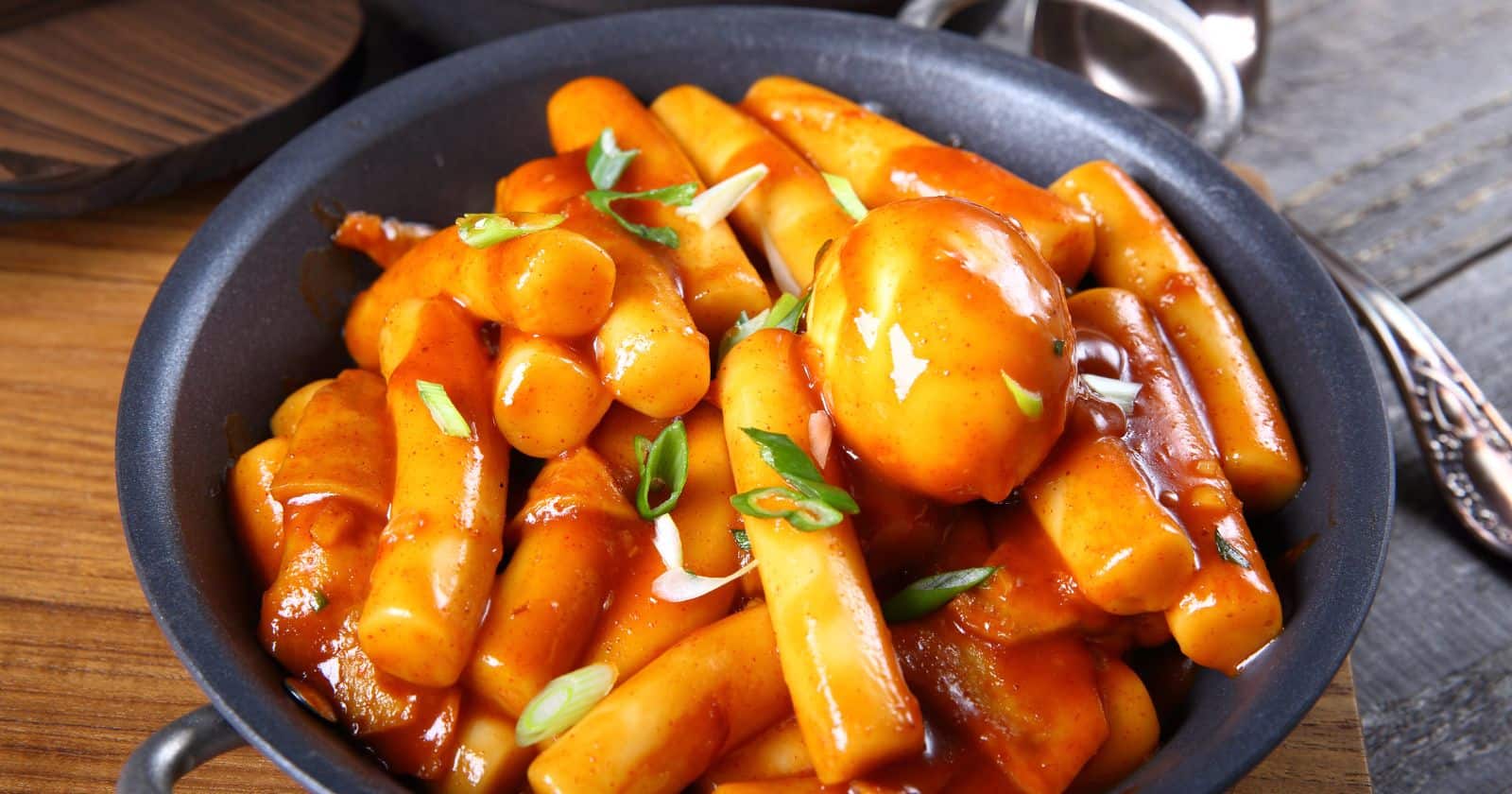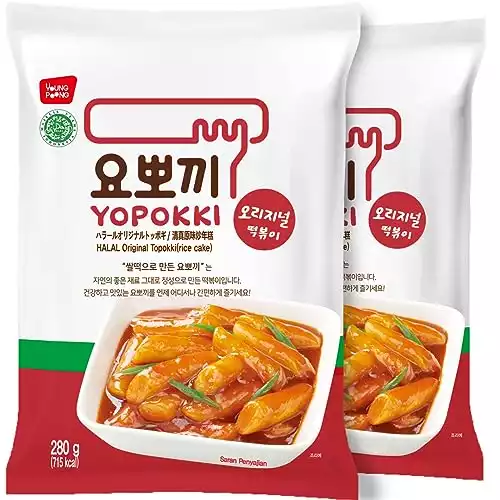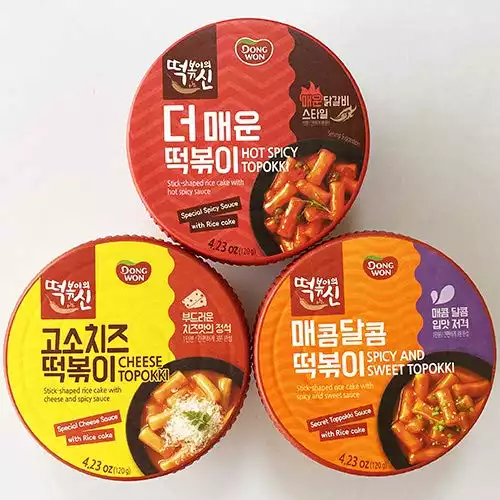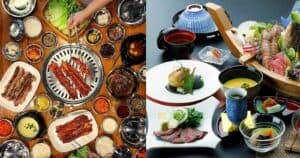Have you ever wanted to try making the popular Korean street food tteokbokki? This spicy rice cake dish bursts with flavor. But as a Muslim, you may be unsure how to make halal tteokbokki at home.
In this guide, I’ll walk you through everything you need to know to create delicious and halal tteokbokki. You’ll learn about:
- What makes tteokbokki halal or haram
- Finding halal ingredients
- Step-by-step halal tteokbokki recipe
- Tips for customizing your tteokbokki
- Where to eat halal tteokbokki
Let’s get cooking!
What Makes Tteokbokki Halal or Haram?
Tteokbokki is a spicy stir-fried dish made with cylinder-shaped rice cakes called tteok. It’s tossed in a sweet and fiery sauce along with fish cakes, eggs, and veggies.
Some ingredients used in tteokbokki can make it haram (forbidden) for Muslims. These include:
- Pork – Used in some tteokbokki broths
- Alcohol – Found in some tteokbokki sauces
- Beef broth – The beef must be slaughtered in a halal manner
To make halal tteokbokki, you must avoid or swap these ingredients. Let’s look at how.
Finding Halal Tteokbokki Ingredients
You can find alternatives for the potentially haram tteokbokki ingredients:
- Broths – Use chicken or veggie broth instead of pork. Opt for halal beef broth.
- Sauces – Avoid ones with alcohol. Choose halal-certified gochujang.
- Meats – Use halal chicken, beef, or seafood.
Many Korean grocers sell halal-certified gochujang sauce. You can also find halal meats at Muslim grocers or major supermarkets.
When dining out, check if the restaurant has halal certification. Ask about their ingredients if unsure.
Now let’s make some halal tteokbokki!
Halal Tteokbokki Recipe Step-By-Step
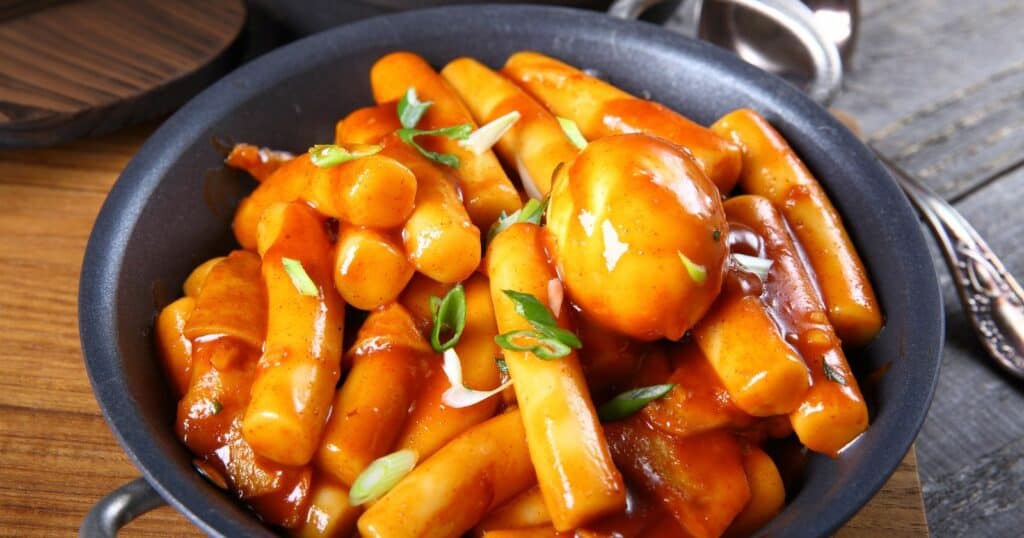
Gather your ingredients:
- 1 cup tteok (rice cakes)
- 3 cups chicken or veggie broth
- 1/2 lb chicken, beef, or shrimp
- 1 onion, sliced
- 1 cup cabbage, chopped
- 2 eggs
- 1/4 cup gochujang
- 1 tbsp soy sauce
- 1 tsp sesame oil
- Scallions and sesame seeds for garnish
Step 1: Soak the tteok in cold water for 30 mins to soften. Drain.
Step 2: In a large pan, combine broth, gochujang, and soy sauce. Bring to a boil.
Step 3: Add tteok and simmer 5 mins until softened.
Step 4: Add protein and veggies and cook 3-5 more mins.
Step 5: Crack eggs into the stew. Cook until eggs are firm.
Step 6: Drizzle with sesame oil. Garnish with scallions and sesame seeds.
Dig into this halal explosion of flavors! The rice cakes soak up the spicy, savory sauce. Feel free to add more gochujang if you like extra heat.
Tips for Customizing Your Halal Tteokbokki
Experiment with mix-ins to make your tteokbokki unique:
- Add kimchi for a pickle-y zing
- Swap in halal ramen noodles for a noodle hybrid
- Top with melted mozzarella for cheesy richness
- Stir in mussels, clams, or oysters for briny seafood flavor
- Garnish with crunchy peanuts, parsley, or cilantro
Have fun and create the halal tteokbokki recipe of your dreams!
Halal Instant Tteokbokki Cup Options
Searching for a quick halal tteokbokki fix? Check out these instant noodle cups that meet halal standards:
Yopokki
Yopokki makes halal certified cups in tasty flavors like Original Spicy, Jjajang, and Hot Spicy. Their instant tteokbokki is produced in Korea.
Dongwon
Dongwon makes a halal instant tteokbokki with a sweet and spicy flavor. Their tasty cups are 120g each.
FAQs About Halal Tteokbokki
Got more questions about making halal tteokbokki? Here are some common FAQs:
Is tteokbokki always spicy?
Nope! The level of
Can I make tteokbokki without fish cakes?
Absolutely. Substitute fish cakes with tofu, mushrooms, or extra vegetables. You can create a 100% plant-based halal tteokbokki.
Is there a quick microwaved tteokbokki recipe?
Yes! You can find handy microwavable tteokbokki cup kits. But double-check that they are halal-certified first.
What drinks pair well with tteokbokki?
Cold milk and sparkling water help balance the heat. Barley tea, beer, or soju complement the flavors too.
Can I use thick udon noodles instead of tteok?
You sure can. Udon noodles hold up well in the spicy broth. Just make sure they are halal-certified.
Make Halal Tteokbokki Tonight
Now you have all the tips and info you need to create amazing halal tteokbokki.
With the right ingredients and recipes, you can craft a mouthwatering dish that aligns with your halal diet.
Invite friends over for a spicy tteokbokki party, or savor a bowl alone as comfort food on a chilly night. However you enjoy it, halal tteokbokki is a hearty and delicious meal.
Let me know how your homemade halal tteokbokki turns out! I’d love to see your creations. Until next time, happy eating!

